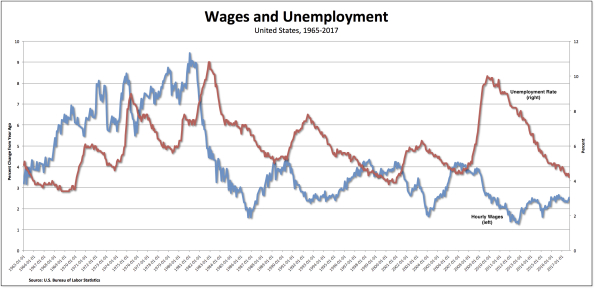From David Ruccio The official unemployment rate continues to fall in the United States. And everyone, at least among top policymakers and the business press, has been promising that workers’ wages will finally break out. As it turns out, the unemployment rate (the red line in the chart above) in September was 4.1 percent, far below the high of 10 percent in October of 2009 and a new low for the so-called recovery from the Second Great Depression. However, hourly wages (for production and nonsupervisory workers, the blue line) rose only 2.5 percent on an annual basis, even less than the 2.7 percent workers were gaining at the height of the depression. The only possible conclusion is that, in the United States, expecting workers’ wages to finally begin to catch up is like Vladimir and
Topics:
David F. Ruccio considers the following as important: Uncategorized
This could be interesting, too:
tom writes The Ukraine war and Europe’s deepening march of folly
Stavros Mavroudeas writes CfP of Marxist Macroeconomic Modelling workgroup – 18th WAPE Forum, Istanbul August 6-8, 2025
Lars Pålsson Syll writes The pretence-of-knowledge syndrome
Dean Baker writes Crypto and Donald Trump’s strategic baseball card reserve
from David Ruccio
The official unemployment rate continues to fall in the United States. And everyone, at least among top policymakers and the business press, has been promising that workers’ wages will finally break out.
As it turns out, the unemployment rate (the red line in the chart above) in September was 4.1 percent, far below the high of 10 percent in October of 2009 and a new low for the so-called recovery from the Second Great Depression. However, hourly wages (for production and nonsupervisory workers, the blue line) rose only 2.5 percent on an annual basis, even less than the 2.7 percent workers were gaining at the height of the depression.
The only possible conclusion is that, in the United States, expecting workers’ wages to finally begin to catch up is like Vladimir and Estragon waiting below a leafless tree for the arrival of someone named Godot.
